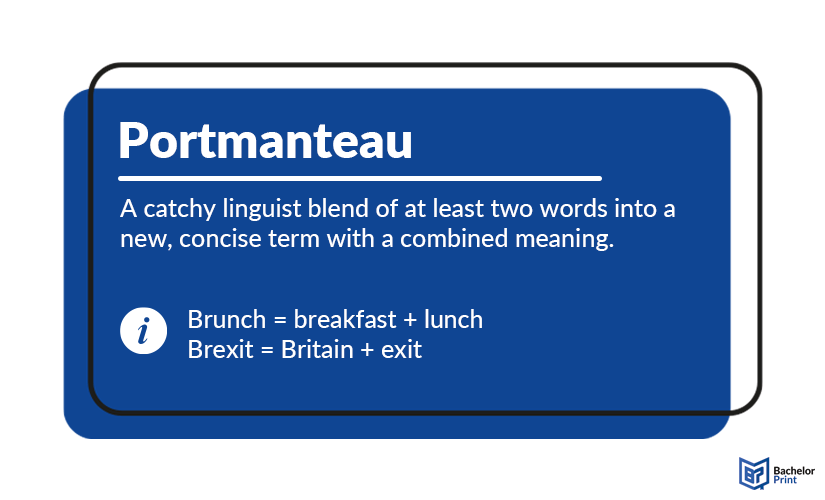
The French word portmanteau might not sound familiar to you, but you definitely used it at least once when planning brunch with your “workaholic” friends or discussing Brexit. Essentially, this stylistic device represents a linguistic blend, where a clever fusion of two words creates a novel term with both meanings. Still bearing with us? This article will shed light on the construction of these blends, their suitability in academic writing, and their etymology.
Definition: Portmanteau
A portmanteau, originally referring to a large suitcase that opens into two equal parts, is a linguistic blend of two or more words, where parts of the original words are combined to form a new word. The new term typically retains elements of both meanings and sounds from the original words, creating a more efficient and expressive means of communication. To create them you usually take the first segment of one word and add it to the last segment of another.

Etymology
The term itself embodies perfectly the concept of combining two elements into a single, cohesive entity, reflecting its origin as a suitcase that opens into two equal parts and its linguistic role in blending meanings and sounds from different words. This stylistic device has its origins in the French language and is a combination of the root words “porter” (to carry) and “manteau” (coat).
Originally, it referred to a large suitcase with two equal halves, used for carrying clothes when going on vacation or for a business trip. The idea of portmanteaus fascinates linguists and language enthusiasts alike and showcases the creative blending of words to form new terms.
Origin & history
The word “portmanteau” has a rich history, originating from French, where it originally referred to a suitcase or traveling bag that opens into two equal parts. This practical meaning was adopted into English in the late 16th century. The most significant shift in its meaning came from Lewis Carroll, who, in his book from 1871, “Through the Looking-Glass,” used it to describe a type of word blending. Carroll explains the concept with the word “slithy” in the poem “Jabberwocky,” where Humpty Dumpty clarifies the term.
“Well, ‘SLITHY’ means ‘lithe’ and ‘slimy.’ ‘Lithe’ is the same as ‘active.’ You see, it’s like a portmanteau – there are two meanings packed up into one word.”
Carroll explained that these words contained two meanings packed into one, similar to a portmanteau suitcase. Nowadays, it refers to a word formed by combining at least two terms, such as “brunch” (breakfast + lunch) and “smog” (smoke + fog), encapsulating the creativity and fluidity of language.
in Your Thesis
Functions
Portmanteaus can be found everywhere you go and are becoming increasingly popular in contemporary English. Occasionally, they are used as synonyms for compound words. However, compound words combine whole words to form a new term, while portmanteaus blend parts of words to create a single, new word with a combined meaning. They serve several essential functions in language, enhancing communication by making it more concise and innovative, and can function as nouns and adjectives describing a blend. This tool serves the following functions:
These words are considered efficient as they condense complex ideas into an easily understandable term.
Their creativity lies in blending distinct concepts to form a novel expression.
They offer precision by succinctly conveying combined meanings.
Trendiness is achieved as they often capture and reflect current cultural phenomena.
Innovation is showcased through their ability to generate fresh and inventive language.
Humor often arises from the clever and unexpected merging of words.
Examples of portmanteaus
| Portmanteau | Original words | Definition |
|---|---|---|
| Brunch | Breakfast + Lunch | A meal that combines both, typically eaten late in the morning. |
| Motel | Motor + Hotel | A roadside hotel primarily for motorists. |
| Smog | Smoke + Fog | Fog that has become mixed and polluted with smoke. |
| Spork | Spoon + Fork | A utensil that combines both features. |
| Spanglish | Spanish + English | A hybrid language combining words and idioms from both languages. |
| Webinar | Web + Seminar | A seminar conducted over the Internet. |
| Blog | Web + Log | A regularly updated website that is written in an informal style. |
| Chillax | Chill + Relax | To calm down and relax. |
| Labradoodle | Labrador + Poodle | A crossbreed dog from a Labrador Retriever and a Poodle. |
| Shopaholic | Shop + Alcoholic | A person who is addicted to shopping. |
| Cosplay | Costume + Play | The practice of dressing up as a character from a movie or video game. |
| Bollywood | Bombay + Hollywood | The Hindi-language sector of the Indian movie-making industry. |
| Brexit | Britain + Exit | The withdrawal of the UK from the European Union. |
| Podcast | iPod + Broadcast | A digital audio file made available on the Internet. |
| Sitcom | Situation + Comedy | A TV/radio show in which fictitious events are presented in a documentary format. |
| Workaholic | Work + Alcoholic | A person who compulsively works excessively hard and long hours. |
| Mocktail | Mock + Cocktail | A non-alcoholic drink mimicking the taste and look of a cocktail. |
| Electronic + Mail | Messages distributed by electronic means from one computer to another device. | |
| Emoticon | Emotion + Icon | A facial expression made with keyboard characters, such as :-). |
| Hangry | Hungry + Angry | The state of being angry as a result of hunger. |
| Medicare | Medical + Care | A federal health insurance program in the US. |
| Metaverse | Meta + Universe | A virtual environment where individuals can connect. |
| Liger | Lion + Tiger | A crossbreed between a male lion and a female tiger. |
| Brangelina | Brad + Angelina | Combination of Brad Pitt and Angelina Jolie. |
| Telethon | Television + Marathon | Television broadcast that lasts for an extended period. |
- ✓ Free express delivery
- ✓ Individual embossing
- ✓ Selection of high-quality bindings
Portmanteaus from other languages
However, portmanteaus are not limited to the English language. As we already know, they have their origins in French. Other languages, such as German or Spanish, also creatively use them to enhance their vocabulary. Here are some interesting blends from other languages, along with an explanation:
French
Not only creative but also very accurate, you might be surprised to learn that vegan cheese is gaining popularity in a country renowned for its dairy consumption. However, they’re not only producing delicious cheese, whether it is vegan or not, but they have also come up with a fancy name for it by combining “faux,” which translates to “fake,” and “fromage,” meaning “cheese.”
Indonesian
This word has nothing to do with the mafia we might think of. It is a combination of the three subjects mathematics, physics, and chemistry, as they are all related somehow.
German
This term describes the mullet hairstyle and is a condensed version of “vorne kurz, hinten lang,” which literally translates to “short in the front, long in the back.”
Japanese
In the Japanese language, many words are formed with the first segments of both words, as seen in the example above, where the term is a combination of ポケット(pocket) and モンスタ (monster).
Brazilian Portuguese
The term “aborrescente” describes an annoying teenager and is a combination of “aborrecer” (annoy) and “adolescente” (teenager).
European Portuguese
This term describes someone who is a singer and songwriter. In other words, a “sing-songwriter.”
Spanish
This popular Spanish example is a combination of “gallo,” which translates to “rooster,” and “elefante,” referring to an elephant. It refers to a fictional creature that gained popularity through the Spanish children’s television program “Juego de Niños,” which aired in the 1980s and early 1990s. The show involved children describing various concepts or objects in their own words, often leading to humorous and endearing explanations. Contestants, usually celebrities, had to guess what the children were describing. The term “gallifante” was coined by the show’s host, Amparo Soler Leal, and it became synonymous with a reward given to the contestants for correct answers. The gallifante itself was depicted as a whimsical, bird-like creature, blending the Spanish words “gallo” (rooster) and “elefante” (elephant), and became a beloved symbol of the show, representing the innocence and creativity of children’s imagination.
FAQs
A portmanteau is a linguistic blend of at least two words, usually combining the first segment of one word with the last segment of another, creating a single and cohesive term.
The origin of these words lies in their etymology from the French word “porter” (to carry) and “manteau” (coat), referring to a suitcase with two compartments, and was popularized in a linguistic sense by Lewis Carroll.
Some well-known examples of this stylistic device are:
- Brunch (breakfast + lunch)
- Smog (smoke + fog)
- Hangry (hungry + angry)
The key difference between portmanteaus and compound words is that the former blends parts of two words (e.g., brunch), while the latter joins two whole words (e.g., toothbrush).